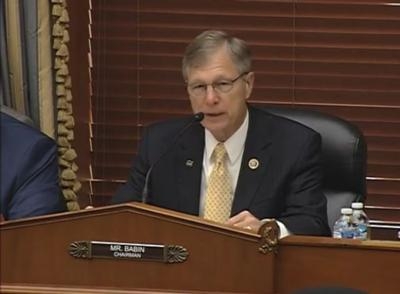Subcommittee Leadership Vows To Maintain U.S. Leadership In The Field
The Space Subcommittee this week held a hearing to examine the current state of the small satellite commercial launch industry, which generates hundreds of billions of dollars of economic activity and serves both the private and public sector. Several companies are currently working to supply the growing demand for commercial launches. Witnesses discussed various policy challenges that may need to be addressed.

“I am committed to addressing the critical issues facing our commercial space industry and finding common ground and responsible solutions that meet the needs of our nation, grow our economy, and maintain our leadership in space," said Space Subcommittee Chairman Brian Babin (R-TX) (pictured). "There is a great deal of promise in the future of space. But if we fail to provide long-term solutions to the issues our nation faces, we may well lose our leadership in space. I, for one, will not allow that to happen on my watch.”
According to a committee news release, significant research and development (R&D) investments are being made in the United States to create and manufacture new types of small satellite technologies and applications. One of the largest barriers that small satellite companies face is the cost of launch.
A number of American companies, in various stages of development, plan to offer dedicated launch services to the small satellite industry in the next few years. These companies promise to provide more flexible launch services such as delivery to unique orbits and rapid replenishment.
One significant policy question surrounds excess intercontinental ballistic missiles (ICBM) motors. These government-owned Cold War era rockets have the potential to provide commercial launch capabilities. However, it is long-standing national policy that excess ICBMs should not be used for commercial launch services.
Those in favor of allowing excess ICBMs to be used for commercial launch services argue that many U.S. small satellites have launched on Russian DNEPR vehicles, derived from Russian ICBMs, and that by modifying existing U.S. policy, U.S. launch services could compete with Russia and bring this business back to America. Those in favor also argue that there is a cost to the taxpayer associated with storing excess ICBMs. By allowing the U.S. commercial launch industry to use excess ICBMs, you not only lower the tax burden, but also create potential revenue derived from the sale of these motors.
The committee said in the release that those that oppose the policy change raise legitimate concerns that allowing excess ICBMs to be used for commercial launch purposes could distort the market in the United States, undermine future investment, and delay innovations that are on the horizon.
Witnesses at the hearing also discussed policy implications surrounding access to foreign launch services. A number of companies that build and operate small satellites contend that there isn’t enough capacity in the market at a price they can afford to meet their needs. India has stepped in and offered to fill, in part, this demand and is launching smaller U.S. satellites on their Polar Satellite Launch Vehicle (PSLV) vehicle. Several members question the current ad-hoc policy governing U.S. commercial satellite access to Indian PSLV launches.
(Source: House Space Subcommittee news release)
 ANN's Daily Aero-Term (05.19.25): Fuel Remaining
ANN's Daily Aero-Term (05.19.25): Fuel Remaining ANN's Daily Aero-Linx (05.19.25)
ANN's Daily Aero-Linx (05.19.25) Klyde Morris (05.16.25)
Klyde Morris (05.16.25) Airborne 05.19.25: Kolb v Tornados, Philippine Mars, Blackhawk Antler Theft
Airborne 05.19.25: Kolb v Tornados, Philippine Mars, Blackhawk Antler Theft Airborne-Flight Training 05.15.25: Ray Scholarship, Alto NG, Fighter Training
Airborne-Flight Training 05.15.25: Ray Scholarship, Alto NG, Fighter Training



